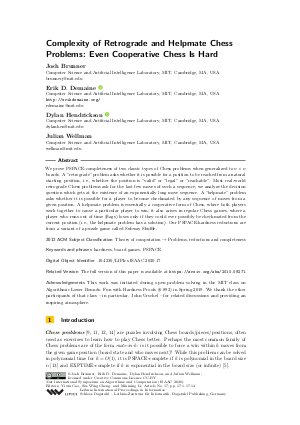Complexity of Retrograde and Helpmate Chess Problems: Even Cooperative Chess Is Hard
Authors
Josh Brunner,
Erik D. Demaine  ,
Dylan Hendrickson
,
Dylan Hendrickson  ,
Julian Wellman
,
Julian Wellman
-
Part of:
Volume:
31st International Symposium on Algorithms and Computation (ISAAC 2020)
Part of: Series: Leibniz International Proceedings in Informatics (LIPIcs)
Part of: Conference: International Symposium on Algorithms and Computation (ISAAC) - License:
 Creative Commons Attribution 3.0 Unported license
Creative Commons Attribution 3.0 Unported license
- Publication Date: 2020-12-04
File

PDF
LIPIcs.ISAAC.2020.17.pdf
- Filesize: 0.72 MB
- 14 pages
Document Identifiers
Related Versions
-
The full version of this paper is available at https://arxiv.org/abs/2010.09271.
Subject Classification
ACM Subject Classification
- Theory of computation → Problems, reductions and completeness
Keywords
- hardness
- board games
- PSPACE
Metrics
- Access Statistics
-
Total Accesses (updated on a weekly basis)
0Document
0Metadata
Abstract
We prove PSPACE-completeness of two classic types of Chess problems when generalized to n × n boards. A "retrograde" problem asks whether it is possible for a position to be reached from a natural starting position, i.e., whether the position is "valid" or "legal" or "reachable". Most real-world retrograde Chess problems ask for the last few moves of such a sequence; we analyze the decision question which gets at the existence of an exponentially long move sequence. A "helpmate" problem asks whether it is possible for a player to become checkmated by any sequence of moves from a given position. A helpmate problem is essentially a cooperative form of Chess, where both players work together to cause a particular player to win; it also arises in regular Chess games, where a player who runs out of time (flags) loses only if they could ever possibly be checkmated from the current position (i.e., the helpmate problem has a solution). Our PSPACE-hardness reductions are from a variant of a puzzle game called Subway Shuffle.
Cite As Get BibTex
Josh Brunner, Erik D. Demaine, Dylan Hendrickson, and Julian Wellman. Complexity of Retrograde and Helpmate Chess Problems: Even Cooperative Chess Is Hard. In 31st International Symposium on Algorithms and Computation (ISAAC 2020). Leibniz International Proceedings in Informatics (LIPIcs), Volume 181, pp. 17:1-17:14, Schloss Dagstuhl – Leibniz-Zentrum für Informatik (2020)
https://doi.org/10.4230/LIPIcs.ISAAC.2020.17
BibTex
@InProceedings{brunner_et_al:LIPIcs.ISAAC.2020.17,
author = {Brunner, Josh and Demaine, Erik D. and Hendrickson, Dylan and Wellman, Julian},
title = {{Complexity of Retrograde and Helpmate Chess Problems: Even Cooperative Chess Is Hard}},
booktitle = {31st International Symposium on Algorithms and Computation (ISAAC 2020)},
pages = {17:1--17:14},
series = {Leibniz International Proceedings in Informatics (LIPIcs)},
ISBN = {978-3-95977-173-3},
ISSN = {1868-8969},
year = {2020},
volume = {181},
editor = {Cao, Yixin and Cheng, Siu-Wing and Li, Minming},
publisher = {Schloss Dagstuhl -- Leibniz-Zentrum f{\"u}r Informatik},
address = {Dagstuhl, Germany},
URL = {https://drops.dagstuhl.de/entities/document/10.4230/LIPIcs.ISAAC.2020.17},
URN = {urn:nbn:de:0030-drops-133618},
doi = {10.4230/LIPIcs.ISAAC.2020.17},
annote = {Keywords: hardness, board games, PSPACE}
}
Author Details
Acknowledgements
This work was initiated during open problem solving in the MIT class on Algorithmic Lower Bounds: Fun with Hardness Proofs (6.892) in Spring 2019. We thank the other participants of that class - in particular, John Urschel - for related discussions and providing an inspiring atmosphere.
References
-
Jeffrey Bosboom, Spencer Congero, Erik D. Demaine, Martin L. Demaine, and Jayson Lynch. Losing at Checkers is hard. In The Mathematics of Various Entertaining Subjects (MOVES 2017), volume 3, pages 103-118. Princeton University Press, 2019.

-
Josh Brunner, Lily Chung, Erik D. Demaine, Dylan Hendrickson, Adam Hesterberg, Adam Suhl, and Avi Zeff. 1 × 1 Rush Hour with fixed blocks is PSPACE-complete. In Proceedings of the 10th International Conference on Fun with Algorithms, pages 7:1-7:14, La Maddalena, Italy, 2020.

- Marzio De Biasi and Tim Ophelders. Subway Shuffle is PSPACE-complete. Manuscript, February 2015. URL: http://www.nearly42.org/cstheory/subway-shuffle-is-pspace-complete/.
- FIDE. FIDE Laws of Chess. https://handbook.fide.com/chapter/E012018, 2018.
-
Aviezri S. Fraenkel and David Lichtenstein. Computing a perfect strategy for n × n Chess requires time exponential in n. Journal of Combinatorial Theory, Series A, 31:199-214, 1981.

- Robert A. Hearn. Games, Puzzles, and Computation. PhD thesis, Massachusetts Institute of Technology, 2006. URL: http://erikdemaine.org/theses/bhearn.pdf.
-
Robert A. Hearn and Erik D. Demaine. Games, Puzzles, and Computation. A K Peters/CRC Press, 2009.

-
David Hooper and Kenneth Whyld. The Oxford Companion to Chess. Oxford University Press, 2nd edition, 1992.

-
John Nunn. Solving in Style. Gambit Publications, 2nd edition, 2002.

- Yaroslav Shitov. Chess God’s number grows exponentially. arXiv:1409.1530, 2014. URL: http://arxiv.org/abs/1409.1530.
-
Raymond M. Smullyan. The Chess Mysteries of Sherlock Holmes: 50 Tantalizing Problems of Chess Detection. Alfred A. Knopf, 1979. Reprinted by Dover, 2012.

-
Raymond M. Smullyan. The Chess Mysteries of the Arabian Knights: 50 New Problems of Chess Detection. Alfred A. Knopf, 1981.

- James A. Storer. On the complexity of Chess. Journal of Computer and System Sciences, 27(1):77-100, 1983. URL: https://doi.org/10.1016/0022-0000(83)90030-2.
- Wikipedia. Chess problems. https://en.wikipedia.org/wiki/Chess_problem, 2020.
- Wikipedia. Helpmate. https://en.wikipedia.org/wiki/Helpmate, 2020.
